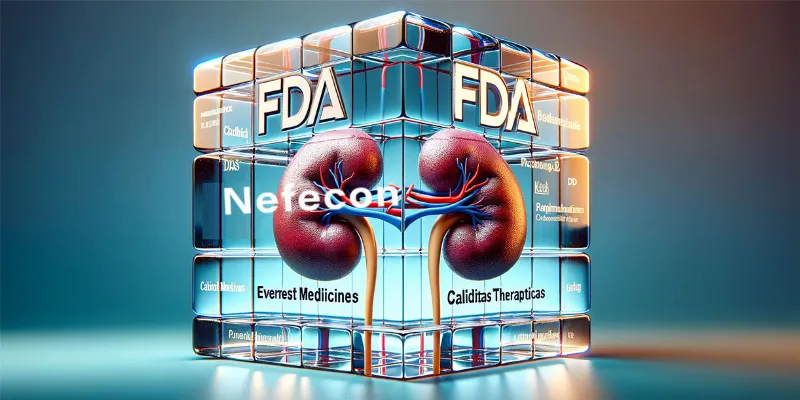FDA Approves Everest's Nefecon for IgA Nephropathy Treatment


FDA & EMA |
22 December 2023
Everest Medicines' licensing partner Calliditas Therapeutics announced that the FDA approved Nefecon to reduce the loss of kidney function in adults with primary immunoglobulin A nephropathy (IgAN) at risk for disease progression. Nefecon is the first fully FDA-approved treatment for IgAN based on a measure of kidney function.
In a landmark development, Everest Medicines' licensing partner, Calliditas Therapeutics, has announced the FDA's full approval of Nefecon for treating IgA nephropathy (IgAN), offering new hope to patients at risk of declining kidney function. This innovative drug, designed to target the root cause of IgAN, has demonstrated a 50% reduction in kidney function deterioration. Nefecon represents a significant milestone in the global management of this complex renal condition.
"We congratulate our partner on the full FDA approval of Nefecon, which confirms the drug’s capability to preserve kidney function and significantly delay disease progression. This first-ever fully FDA-approved treatment for IgAN represents a beacon of hope for the entire IgAN community globally. On the back of this important milestone, we are excited to be launching this first-in-disease treatment in China in the first quarter of 2024,” said Rogers Yongqing Luo, Chief Executive Officer of Everest Medicines.
A Major Breakthrough in Kidney Disease Treatment
Nefecon is an oral, delayed-release formulation of budesonide and a breakthrough B-cell immunomodulator. It targets the core of IgA nephropathy (IgAN), a complex chronic kidney disease, by reducing harmful IgA1 antibodies. A two-year study supports Nefecon's effectiveness in preserving kidney function.
Key points from the clinical trials include:
- Statistically Significant Results: Nefecon showed a significant reduction in the decline of estimated glomerular filtration rate (eGFR) compared to a placebo, offering a 50% lesser deterioration in kidney function.
- Results from China: The treatment's impact was even more pronounced in the Chinese subpopulation, showing approximately 66% less deterioration in kidney function.
- Broad Patient Impact: The FDA's approval encompasses all adults with primary IgAN, regardless of proteinuria levels, a common symptom of the disease.
Professor Zhang Hong, a member of the global steering committee for the Phase 3 NefIgArd clinical trial and based at Peking University First Hospital, highlights Nefecon's potential: “This medicine offers patients a truly disease modifying treatment with sustained and clinically meaningful reduction in eGFR declines along with durable proteinuria reduction. The FDA full approval and the China approval allow physicians to take more proactive measures in managing the impact of the disease to preserve kidney function.”
The FDA's approval of Nefecon signifies not just a regulatory milestone but a step forward for patients battling IgAN globally. Its impact on kidney function preservation and disease progression delay signals a hopeful turn in managing this challenging condition.
China, having the world's largest IgAN patient population with typically more rapid disease progression, stands to greatly benefit from Nefecon. Everest Medicines plans to launch the treatment in China in early 2024.
More about Nefecon
Further subpopulation analysis from the NefIgArd clinical trial showed a numerically greater treatment effect in kidney function prevention, proteinuria reduction, and microhematuria improvement in the Chinese subpopulation compared to the global population. The mean absolute change from baseline in eGFR at 24 months showed approximately 66% less deterioration in kidney function with 9-month Nefecon treatment compared with a smaller preservation of kidney function (50%) in the global population. Patients treated with Nefecon in China showed a 43% greater reduction (95% CI 8%, 65%) in UPCR compared with placebo at 24 months and a 31% greater reduction (95% CI 0, 53) at 9 months. In the global population, Nefecon treatment provided an approximately 30% greater reduction in UPCR at both 24 months and 9 months compared to placebo. The proportion of Chinese patients without microhematuria in the Nefecon group increased from 26.9% at baseline to 57.7% during observational follow-up, while it was maintained at 14.3% in the placebo group.











Comments
No Comments Yet!